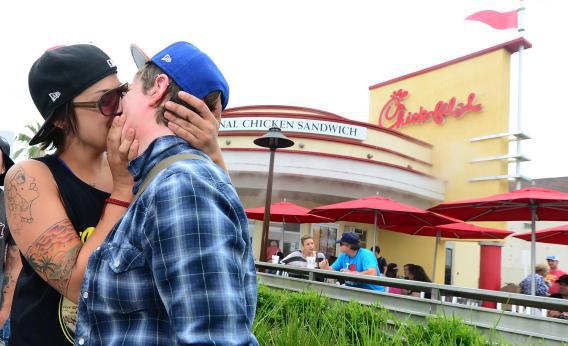Last week, the web was greasy with posts and tweets and general histrionics regarding Chick-fil-A and The Gays. Wednesday’s Mike Huckabee-spawned “National Chick-fil-A Appreciation Day” saw thousands of Americans line up at a mediocre fast food chain to exercise their freedom to eat and be hateful (two-for-one!), while Friday, some smaller number of adventurous gay couples took pictures of themselves outside the restaurant using their mouths in a different way. I wasn’t impressed with either demonstration.
As a gay guy, I couldn’t care less what a bigoted poultry mogul thinks about me and my romantic life, and I don’t believe that the stakes of the “to eat or not to eat” question are all that high. Moreover, in an era in which gay visibility is no longer lacking, the political point of a “kiss-in” is lost on me—what do you want, a cheer of approval from the teenager working the drive-through window who very likely supports you anyway? And now it’s Starbucks Appreciation Day (excuse me, rebranded to: “National Marriage Equality Day”), and I’m supposed to drink burnt coffee and otherwise patronize businesses who do approve of me. When did fighting for civil rights get delegated to my debit card?
A few things up front: I think it’s fine to boycott Chick-fil-A or any other company if doing so makes you feel good. But given that the only probable result is a savvy PR calibration and miniscule impact on the bottom-line, let’s remember that boycotts rarely carry more than symbolic weight. In any case, I certainly won’t be having waffle fries anytime soon, but then again, I never did before, so no sacrifice there. I also agree with Jesse Bering, who wrote in Slate that the real damage this whole dust-up has wrought is likely on the mental stability of young LGBT kids—and, for that, as he so eloquently put it, “fuck you” to the homophobes.
That being said, it’s worth asking what it means that the discourse surrounding gay equality has become so, well, corporate. When freeway-exit restaurants become the battleground upon which we fight, haven’t we taken a dangerous detour on the way to someplace more appropriate like, I don’t know, Washington? Watching both sides over the past few weeks, I can’t help but feel like everyone is way too interested in getting a pat on the head from some daddy-figure CEO, or giving a pat to the one holding the most “on-brand” set of values. It’s almost as if we’ve begun to treat corporations as [gulp] real people.
The stench of corporate personhood is all over this thing. Both the Left and Right are looking to boardrooms for guidance not only on what to buy, but also on what to believe. Corporations have become role models, moral actors worthy of praise or derision depending on your point of view. By this logic, someone named Chick-fil-A “hates” me while a certain Starbucks “loves” me, and I should respond in kind.
The weirdness of the moment is fully on display in the confusion patrons and protestors have experienced over the difference between the values of the corporate “person” and of the individual people working for it. The Huffington Post had a great piece on the experiences of gay Chick-fil-A employees last week in which we learn that, in the rush to engage in one way or another with Mr. Corporation, people were ironically unwilling to speak with the REAL people right in front of them. Gays were mean to other gays and homophobes missed an opportunity to deliver their hate directly—or maybe even to feel a little human empathy.
But far more concerning is the continuing merger of consumption with political action. As Alexandra Chasin explores in her book Selling Out: The Gay and Lesbian Movement Goes to Market, one of the more troubling trends of the 20th century was the recasting of political rights as economic freedom of choice—call it shopping as activism. Chasin points out that not only is this vision of social struggle lazy (not to mention exclusionary to poor people), but that it also “accepts the premise that the market can and should both shape and enact social policy, as well as the assumption that the market will lead toward increasingly moral social policy.”
When we look to corporations for statements on sociopolitical issues, we’re promoting them to a status far beyond mere product or service provider. Suddenly, Starbucks and Chick-fil-A are being called upon to make moral judgments. The problem is, as organizations whose commitments shift with every quarterly profit report, they are supremely unqualified to make those kinds of pronouncements.
As the culture wars heat up in the months preceding the Presidential election and various gay marriage ballot referenda, our assumptions about how we can effect change demand interrogation. Do we, to borrow a phrase from Chasin, really want our citizenship to be located squarely in the marketplace? Is affirming the moral and political influence of corporations really the precedent we want to set? Instead of—or at least in addition to—boycotting and kissing at Chick-fil-A, wouldn’t our energies be better spent working to dismantle the corrupt system that allows businesses to mess about in politics in the first place?
An activism made of chicken sandwiches and creamy frappes is appealing because it’s easy and visible. But in the struggle for true social and legal equality, “voting with your dollar” may not get you much.
